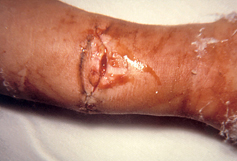How infectious diseases are spread and simple and practical advice for preventing the spread of infection in the home and community
Botulism - including symptoms, treatment and prevention
Botulism is an illness caused by botulinum toxin or other similar toxins. Botulinum toxin is made by Clostridium botulinum bacteria and some other similar bacteria. The bacteria are widespread in the environment as spores. Spores are dormant forms of bacteria which are resistant to heat and drying. Under specific conditions, the spores of the bacteria germinate and make toxin.
Botulism is a notifiable condition1
How botulism is spread
Botulism may occur in several ways:
 Foodborne botulism may result from eating food contaminated with the toxin. This may be from poorly processed canned or bottled low acid foods, fermented foods or lightly preserved foods.
Foodborne botulism may result from eating food contaminated with the toxin. This may be from poorly processed canned or bottled low acid foods, fermented foods or lightly preserved foods.- Infant botulism results from the germination of ingested spores (for example, from honey or soil) inside the bowels of infants.
- Intestinal botulism results from the germination of ingested spores inside the bowels of people with altered bowel bacteria.
- Wound botulism results from spore contamination of dirty wounds or in illicit injecting drug use (see image).
- Iatrogenic botulism may occur due to accidental injection into the blood stream of commercial botulinum toxin (for example, Botox®, Dysport® or Xeomin®).
- Inhalational botulism does not occur naturally but would result from breathing in toxin used as a biological weapon.
Image courtesy Public Health Image Library (PHIL), Department of Health and Human Services, Centers for Disease Control and Prevention (CDC-USA)
Signs and symptoms of botulism
Symptoms may include:
- fatigue
- weakness
- vertigo (dizziness)
- blurred vision
- dry mouth
- difficulty swallowing
- difficulty speaking
- paralysis of the muscles which move the eyes
- drooping eyelids
- paralysis
One to ten percent of persons with botulism die as a result.
Foodborne
As well as the symptoms listed above, symptoms of foodborne botulism may include:
- nausea
- vomiting
- diarrhoea
- abdominal cramping
Infants
 In infants the following symptoms may occur:
In infants the following symptoms may occur:
- constipation
- poor suck
- altered cry
- weakness
- poor head control (see image)
Diagnosis of botulism
The diagnosis is made from the history and signs and symptoms of infection (clinical features).
Diagnosis can be confirmed by detection of toxin in clinical specimens such as faeces or blood.
In foodborne botulism, toxin may be detected in the contaminated food item.
Incubation period
(time between becoming infected and developing symptoms)
- Foodborne botulism: usually 12 to 36 hours, but sometimes several days.
- Infant botulism: unknown.
- Intestinal botulism: unknown.
- Wound botulism: up to 14 days.
- Inhalational botulism: probably between 12 hours and 3 days.
Infectious period
(time during which an infected person can infect others)
Botulism is not spread from person to person.
Treatment for botulism
An anti-toxin is available.
In infant botulism, botulism immune globulin can be used (BabyBIG®).
In non-fatal cases, recovery may be prolonged.
Prevention of botulism
Exclusion from childcare, preschool, school and work is not necessary.
Foodborne botulism
- ensure safe home and commercial canning and bottling by:
- using good quality and fresh produce
- ensuring foods are sufficiently acidic either naturally or by addition of acid (for example, lemon juice, citric acid or vinegar)
- ensuring foods are properly heat processed
- using appropriate equipment
- ensure proper processes in the making of fermented foods
- follow the manufacturer’s instructions for food storage and shelf life
- avoid consuming foods from damaged cans or bottles
- keep cold food below 5°C and hot food above 60°C.
Infant botulism
- avoid feeding honey to infants less than 12 months of age.
Wound botulism
- clean thoroughly any dirty wounds and seek medical care
- avoid illicit injecting drug use
Iatrogenic botulism
- use only licenced products and follow the manufacturer’s instructions.
Useful links
- Hand hygiene
- Keeping areas clean
- Preventing food poisoning at home
- Shopping and storing of food at home
- Collecting a faecal sample
- When you have a notifiable condition
1 - In South Australia the law requires doctors and laboratories to report some infections or diseases to SA Health. These infections or diseases are commonly referred to as 'notifiable conditions'.
Image 1 and 2 - Image courtesy of Public Health Image Library (PHIL), Department of Health and Human Services, Centers for Disease Control and Prevention (CDC-USA)